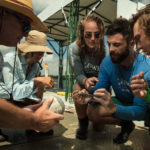UWF students headed on “Great American Urban Adventure”
St. Augustine wrote "The world is a book, and those who do not travel read only a page." University of West Florida Public History students participating in the unique travel course, "Great American Urban Adventure," need not worry. By the end of their 25-day journey traversing the urban Northeast and Midwest, these travelers will have consumed volumes.
St. Augustine wrote “The world is a book, and those who do not travel read only a page.” University of West Florida Public History students participating in the unique travel course, “Great American Urban Adventure,” need not worry. By the end of their 25-day journey traversing the urban Northeast and Midwest, these travelers will have consumed volumes.
“We will learn about American urban history from the colonization to the creation of the metropolis at the physical sites and locations where events occurred,” said Patrick Moore, associate professor of History. “This will result in an unparalleled opportunity to develop a comprehensive understanding of the region’s history.”
To that end, on July 7 Moore and almost a dozen students comfortably loaded into three mini-vans will embark on a journey that will start in Charleston, S.C. and end in Chicago, Ill., with stops in such cities as Williamsburg, Washington D.C., Baltimore, Philadelphia, New York, Boston, Niagara and Detroit. Moore said that the entourage will spend approximately two days in each location, but they will take extra time to explore history-rich Washington D.C.
“We’ve arranged for a special tour of the Capitol and Capitol Hill and will tour the Smithsonian and other places with historical relevance while in D.C.,” said Moore. “The students will also have lots of free time to explore on their own.”
Roy Oberto, graduate student in Public History, is looking forward to going to Fenway Park in Boston and to the behind-the-scenes tours in Washington D.C, but views every stop as an opportunity to enhance his knowledge of public history.
“Rarely have I had the opportunity to study a specific historic location and travel to observe its present physical condition,” said Oberto. “From this trip, I hope to improve my knowledge of the foundation and expansion of American culture and to learn where our culture began and how it has developed.”
A highlight of the trip for all involved will be a visit to Cedar Point Amusement Park, situated on Lake Erie in Sandusky, Ohio. The “Roller Coaster Capital of the World,” established in 1870, while of obvious historical value, will also provide a day of unbridled fun to the group who will be nearing the end of their odyssey at this point.
While the trip offers an enjoyable alternative to classroom learning, the six-credit course does require students to conduct research and document their work and experience. The week-long intensive class which took place in early May and covered everything from colonization to present urbanization culminated in a series of historic podcasts. The trip itself will also be documented through written records, videotape and photographs and podcasts will be uploaded to the Department of History Web site on a daily basis.
“I could teach the material just sitting in a classroom,” said Moore. “But to really understand urbanization I find it much more effective to use a more hands-on approach. During our travels, we will meet with experts in museums, politics, urban development and other fields to enrich our once-in-a-lifetime experience.”
For more information, contact Moore at (850) 474-2683 or e-mail pmoore@uwf.edu. Learn more about UWF’s Department of History at uwf.edu/history.
By Stacey Lewis, University Marketing Communications


